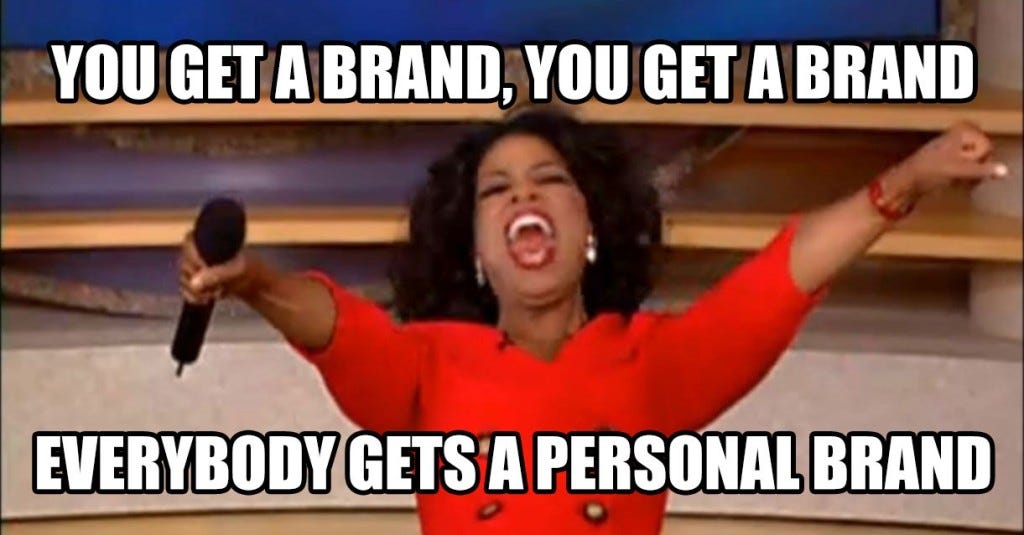I recently read a very good but disconcerting Vox article by Rebecca Jennings about the inescapable pressure to become a personal brand as an artist. It begins with an anecdote that hits too close to home:
When Rachael Kay Albers was shopping around her book proposal, the editors at a Big Five publishing house loved the idea. The problem came from the marketing department, which had an issue: She didn’t have a big enough following.
Or: no pre-existing platform, no publishing deal.
You’d think that promoting the book is the marketing department’s job, but what do I know? Turns out that marketing departments focus on marketing products by people who already have a substantial following because that’s (shudder) the greatest and safest return on investment.
One ticket out of here, please.
To get such a ‘following’, however, is a stroke of sheer luck for a few unicorns, but a relentless grind for many others. The article spells it out explicitly:
While Big Tech sites like Spotify claim they’re “democratizing” culture, they instead demand artists engage in double the labor to make a fraction of what they would have made under the old model.
(Does that remind you of Substack’s ‘new economic engine for culture’? There’s that creepy feeling tap dancing down my spine again…)
The double labor in that quote refers to not only having to do the writing, or singing, or (digitally) drawing - in short, the ‘creating’ - but on top of that also being responsible for your own promotion. And:
It’s precisely the kind of work that is uncomfortable for most artists, who by definition concern themselves with what it means to be a person in the world, not what it means to be a brand.
I enjoy writing here (and elsewhere — say hello if you need some human-certified words, wink wink). I do not enjoy promoting my writing. Here, have another ironic button:
Quoted in the Vox article, author Naomi Klein gets to the heart of it:
Neoliberalism has created so much precarity that the commodification of the self is now seen as the only route to any kind of economic security. Plus social media has given us the tools to market ourselves nonstop.
If self-promo takes precedence and becomes the priority, are you a person or a product? A person as a product? And then, you land right in a catch-22. The more time and energy you spend on self-promo, the less time and energy you have left1 to dedicate to the thing you actually want to do in the first place. You’ll get better at product placement and management, but your art, your acts of creation, the things that make your heart sing, will suffer. (Let’s not even get into the whole AI hype…)
There is no escape. That is the paradox of creation in the age of the internet. It has truly and massively opened the door to virtually (puns!) anyone to share their writing, their art, or their music online. Yet, this also means that it gets increasingly harder to have your work seen. At that point, you either hope Lady Fortuna smiles at you, or you generate deliberate controversy (one of the few reliable engines of engagement), or you happen to know the ‘right’ people.
But let’s say it happens. The stars align and your follower count explodes. Hearts, likes, and shares flood and floor you. Even then, there is no escape. Those who, often unintentionally, have found themselves in the favor of the fickle algorithmic gods that decide where our collective attention goes, crash and burn like the rest of us mere mortals. The fallout of going viral can be brutal. There are many stories about YouTubers, Instagrammers, and other influencers, who, despite all outward signs of ‘having a successful platform’, simply can’t do it anymore and hit a wall hard. Once you hit big numbers, you better keep those numbers up. And how’s that engagement rate doing? Having a bad day? Better turn it into a reel about mental health. Relationship crisis? Better share the drama; good for the clicks. Don’t get me wrong. I’m not saying there’s anything wrong with sharing those things if you choose to. What is wrong is the pressure to share them, to - as Klein’s quote puts it - commodify those human experiences into products for fast and shallow consumption.
Some things need - deserve! - more time to digest than the (recent?) internet’s five-second chew-and-spit-out cycle. If you made it here, you’ve already given me more than five seconds and I am grateful for that.
I’ve been struggling with personal branding for a while and I’ve always considered myself as not being/having a brand as such. Which can also be a brand, I’m afraid. “Be (or at least appear) authentic,” the marketing gurus advise, “great for personal branding.”
Second catch-22 of the day.
But, I can still (and will) choose to put person over product, to make any personal brand I might ever need (such is the reality of writing online) coincide with the person behind the many masks I have to wear. I write as me, and that is the ‘voice’ so many writers are looking for. It’s not a secret; it’s you.
The conclusion of Jennings’ Vox piece:
A society made up of human beings who have turned themselves into small businesses is basically the logical endpoint of free market capitalism, anyway. To achieve the current iteration of the American dream, you’ve got to shout into the digital void and tell everyone how great you are. All that matters is how many people believe you.
This is another missive hurled into the void from me, then. But don’t simply believe me. Question me, challenge me, explore ideas with me, and we’ll be more than brands.
We’ll be people.
I’d wager that this is especially true for introverts. We know that when introverts force themselves to be more extroverted than they want to be in specific contexts, this leads to (objectively measurable) mental fatigue.







One of those sad but true realities.
At the same time, the cult of personality has been with humankind in one form or another since forever. In the here and now? Social media mixed with Anglo-American culture and the cultural myths of the self-made individual and DYI just turbocharged it. And that’s why kids’ aspirations for when they grow up, if they ever do, are to be be famous, because now, it’s a job, a career. Who’d a thunk it?